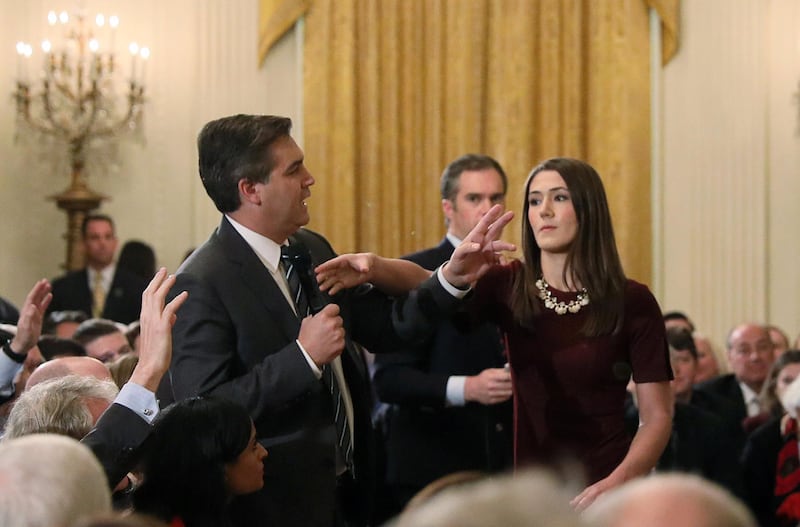The White House on Monday reversed its decision and restored press credentials to CNN’s Jim Acosta following a legal battle that ruled in his favour, but at the same time press secretary Sarah Sanders issues four rules for reporters during press conferences.
According to the White House letter sent to Mr Acosta, the new rules in place require a journalist to “ask a single question and then will yield the floor to other journalists.”
Any follow ups, will be at “the discretion of the President or other White House official taking questions”.
It also defines yielding as “physically surrendering the microphone to White House staff for use by the next questioner”.
If the microphone is not yielded or the journalist asks more than a single question, it “may result in suspension or revocation of the journalist’s hard pass”.
The set of rules represents an unconventional path for the White House in what it calls an attempt to enforce “decorum” in press conferences. It has been met with more questions from reporters and warnings over limiting press freedom and access on Twitter.
Chris Geidner of Buzzfeed tweeted that “these rules would enable any even half-competent speaker to avoid answering any and all questions posed to them by the press”. He called upon the White House correspondents association to oppose the move.
These rules would enable any even half-competent speaker to avoid answering any and all questions posed to them by the press. The @WHCA should strongly oppose this move by the White House. https://t.co/5lwNRrAjzY
— Chris Geidner (@chrisgeidner) November 19, 2018
Steven Dennis of Bloomberg exclaimed that if a White House journalist “asks the president two questions they can lose their hard pass”.
New WH rule: If a journalist asks the president two questions they can lose their hard pass. https://t.co/W05GkyDDrI
— Steven Dennis (@StevenTDennis) November 19, 2018
Aaron Blake of the Washington Post raised a similar concern, saying that “the White House is giving itself permission to refuse follow-up questions. This means Trump/@PressSec can not answer the question, claim they have, and move along.”
Similarly Todd Gilman of Dallas News saw “a threat to ban reporters from the White House for asking a follow-up question without permission even once”.
.@PressSec lays out new rules for White House briefings. There is now a threat to ban reporters from the White House for asking a follow up question without permission even once. pic.twitter.com/KQGSoEKWtI
— Todd J. Gillman (@toddgillman) November 19, 2018
Others including Anthony Zurcher of the BBC lamented the tone of the statement. “This White House statement is best read in the tone of voice of a parent who's not angry at you, she's just ... disappointed.”
This White House statement is best read in the tone of voice of a parent who's not angry at you, she's just ... disappointed. pic.twitter.com/ic9qAGDDDi
— Anthony Zurcher (@awzurcher) November 19, 2018
Ms Sanders herself said these rules have been created “with a degree of regret” but warned of more to come enforcing a code of conduct for all press availabilities by the White House.
“It would be a great loss for all if, instead of relying on the professionalism of White House journalists, we were compelled to devise a lengthy and detailed code of conduct for White House events,” she said.






